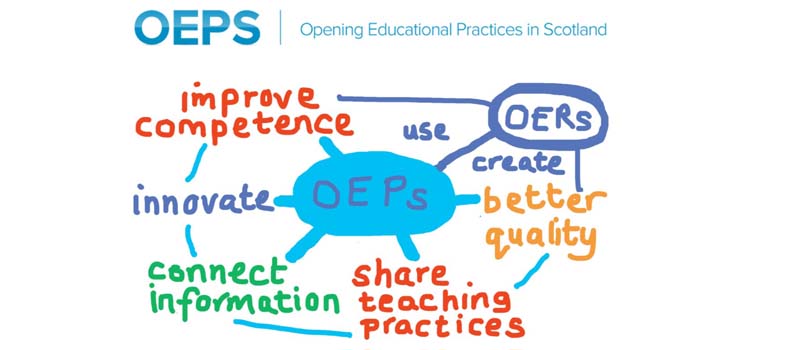Trends in open educational practice in Scotland’s colleges and universities
About this briefing
This briefing is one of a series produced by the Opening Educational Practices in Scotland (OEPS) project. It aims to provide a concise summary of recent trends and developments in the use of free openly licensed educational resources in Scotland. It sits alongside an extensive set of longer reports and briefings produced by the project.
About OEPS
OEPS was a three-year cross-sector project to facilitate best practice in Scottish open education. The project was concerned with the use of openly licensed educational materials, widening participation and social justice. This briefing and others in the series reflects the focus and objectives of the project.
Trends
1. MOOCs – evolution and differentiation
The high profile of Massive Open Online Courses (MOOCs) from late 2011 provided a stimulus for developments in open education more generally. The most obvious outcome of this in Scotland and in the rest of the UK was the decision by a minority of universities to participate in developing courses for one or more of the MOOC platforms. Participation is skewed by institutional mission and the Russell Group institutions are prominent. Comparison of the 2014 and 2106 UCISA UK surveys of Technology Enhanced Learning (TEL) suggests that relative interest in open education has declined as has reported attention to digital literacy and digital participation.
There are significant changes taking place in the use of MOOCs in the UK which reflect similar processes in the US and elsewhere. Institutions and platforms are tending to move towards ‘freemium’ models. Typically this mean that courses are free and open access (albeit often time limited), while certificates and additional services incur a fee. Some institutions in England and internationally are also piloting options for including assessed MOOC study in formal programmes or offering accredited qualifications via a MOOC platform. There is also a trend to partner with other organisations to offer closed packages of skills training via the MOOC platform.
2. Policy development
The Scottish Open Education Declaration has wide recognition in the international learning technology community. It has yet to be taken up at government level although it has influenced the adoption of policy on open education in a small but growing number of Scottish higher education institutions. At a government level there is a tendency to view open as a specialist concern of the university sector.
3. Staff awareness
Awareness of open education among teaching staff in Scottish colleges and universities remains relatively low. There is evidence that professional development opportunities are an effective way of increasing awareness although at the time of writing open education is not part of the TQFE for new college staff or the various Professional Certificates in Higher Education Learning and Teaching that are provided for new university staff.
4. Pockets of innovative practice
Over the three years from 2014 – 2017 the number of examples of innovative practice in Scottish higher education institutions grew rapidly. Examples of good practice from across the sector can be found in the case studies section of the OEPS legacy resources. However, in general good practice remains relatively isolated and is not well known within or between institutions.
5. Platforms
Seven out of the nineteen Scottish higher education institutions contribute courses to the FutureLearn MOOC platform.
JORUM, the UK wide sector repository for open educational resources, was withdrawn by JISC in 2016. JORUM also provided the platform for Re:Source the repository for Scotland’s Colleges run by the College Development Network (CDN). Surveys conducted by the OEPS team in 2015 and 2016 found that awareness of JORUM was low. While there has been no sector-wide replacement for JORUM in Scotland, CDN has launched CDN LearnOnline and there are now three institutions with dedicated show cases for open educational resources; Open.Ed at The University of Edinburgh; edshare@GCU at Glasgow Caledonian University and OpenLearn at the Open University.
Commercial organisations are increasingly engaging with open education. This phenomenon is most advanced in the United States where McGraw-Hill through its acquisition of Knovation and Amazon with its Inspire platform launched in 2017 are targeting the K-12 school market offering curated open content. VLE providers such as Blackboard and Canvas offer similar support.
6. Open Badges
Three years ago Open Badge initiatives in Scotland were small scale and localised. The informal learning sector is leading the way in the use of badges. The Scottish Social Services Council (SSSC) has launched a major initiative with the development of the SSSC Open Badges website. The growth in the number of learners with micro-credentials in the form of Open Badges poses new opportunities and challenges to colleges and universities in supporting transitions to formal study. The OEPS Briefing, Open Badges, Recognition and Credit includes in depth coverage of the SSSC initiative and of the use of Badges at the University of Abertay to recognise co- and extra-curricular activity.
7. Badged Open Courses
There is a growing eco-system of short free open courses. Some like the suite of badged courses (currently twenty one) hosted on OpenLearn are primarily concerned with supporting educational transitions and widening participation. The fourteen exemplar courses co-created by the OEPS project with third sector and Scottish university partners cover transitions, professional development and knowledge exchange. The OEPS courses are hosted on OpenLearn Create, which is a community platform, hosted by the Open University and open to all.
References and further reading
Walker, R., Voce, J., Swift, E., Ahmed, J., Jenkins, M. and Vincent, P. (2016) 2016 Survey of Technology Enhanced Learning for higher education in the UK, Oxford, UCISA.
From the OEPS legacy collection
1. OEPS Briefing: Open Badges, Recognition and Credit
2. OEPS Report: Developing business models for open, online education
3. OEPS Final Report
Pete Cannell (for the OEPS project team)
21 July 2017
You can download this briefing as a document or a
